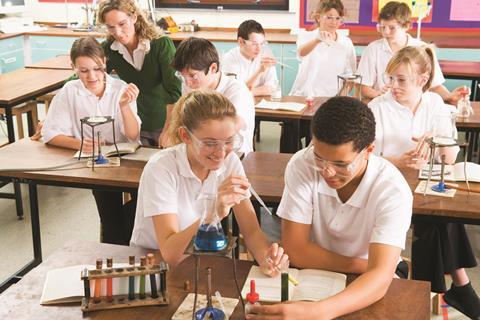Endpoint: Anthony Hardwicke has the last word

Practical work isn't just about equipping pupils with manual dexterity skills, it is a tried and tested method for actively engaging pupils with meaningful discovery and deep learning. As far back as the early 1900s, educationalists have assigned science a special status in the school curriculum because they have recognised that scientific investigation is conducive to learning how to think rationally.
More recent research has confirmed that pupils not only enjoy doing practical work but they are motivated to learning science post-16 if their experience of practical work is positive. My ideal science lessons are practically orientated. But do the latest changes to the Key Stage 3 science curriculum in England fit with this ethos?
The new KS3 curriculum
The KS3 science curriculum now places a huge emphasis - 50 per cent of the programme - on How science works (HSW), the other half of the programme covers scientific content. QCA calls the assessment material for Key Stage 3 Assessment of Pupil Progress (APP), though no assessment material has appeared so far. This isn't a huge surprise because assessing critical and creative thinking skills is notoriously difficult.
How do you tell whether a 14-year old has understood the 'ethical and moral implications of applying science'? The only tried-and-tested option is to get them to write an essay. These could well be essays that are internally levelled by teachers. This type of summative assessment tends to favour pupils with good literacy and communication skills. The traditional 'good-at-science' pupil who enjoys practical problem-solving, but is rather reluctant when it comes to writing the experiment up, I believe, is at a disadvantage and could easily be demotivated and dissuaded from studying science post-16 by bad marks in their essay-style science assessments.
Many of us accept that HSW is an important component of science education. Understandably, many teachers find it easier to deliver the ethical, global, sustainable, and cultural aspects of science in the context of classroom discussion. However, this is a difficult and dangerous strategy when it comes to individual pupil learning. I've seen some excellent chemistry teachers, who are brilliant at facilitating classroom discussions in which every pupil gets involved, but I've also seen some very boring and inactive lessons where it is too easy for pupils to opt out of the discussion.
In the not-too-distant past, there was more emphasis in the specifications on practical work - chemistry textbooks, such as Chemistry by Hunt and Sykes and Chemistry in context by Hill and Holman, came with comprehensive lab manuals with a complete programme of class practicals. The assumption was that we would do most of these practicals in class and maybe use the textbook for homework or background reading. I worry when I look at the current textbooks for the most recent changes, which are being frantically written and churned out at the last minute with little or no instructions for doing practical work.
The position of practical work at KS3 is being squeezed further because it is an added expense to the department. A good department needs modest but steady expenditure to maintain a sufficient stock of glassware and chemicals. But schools are spending so much money on new textbooks and software for ever-changing specifications, there's nothing left in the pot to spend on chemicals and glassware.
A typical A-level chemistry programme requires two textbooks - one for the AS specification (ca £20), another for the A2 specification (another £20), and you can bet there is an accompanying AS student guide (ca £20) and an A2 student guide (ca £20), as well as a CD-ROM at a few hundred pounds.
The challenge
We need to fight to retain practical chemistry in our schools. The main enemies are greedy exam boards and politicians who think the only way to tackle problems is to foist new initiatives onto schools. If practical work grinds to a halt at KS3 - either through costs or over zealous curriculum developers going along with the latest fad - it will be difficult and expensive to get it going again.
Employers want practical skills. Pharmaceutical and agricultural companies are full of state-of-the-art labs filled with scientists doing experiments. Scientists play a vital role in the UK economy and when heads of industry clamour for more trained scientists, they're talking about practical problem-solvers, not people who can write essays. They want teachers to nurture the geeky pupils (the ones who enjoy learning element symbols and blowing things up) and reward them with good test results and exam grades.
Anthony Hardwicke is the 2008-09 Royal Society of Chemistry teacher fellow based at the Institute of Education, 20 Bedford Way, London WC1H 0AL






No comments yet